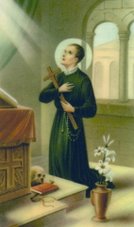STATUIT ei Dóminus testaméntum pacis, et príncipem fecit eum: ut sit illi sacerdótii dígnita ub aetérnum.
The Lord made to him a covenant of peace, and made him a prince; that the dignity of priesthood should be to him for ever.
The Lord made to him a covenant of peace, and made him a prince; that the dignity of priesthood should be to him for ever.
Ecclesiasticus 45:30
030.JPG) Today's feast celebrates the episcopal dignity and universal primacy of St Peter, Prince of the Apostles. It has only a remote relation to the material chair, whose reliquary is pictured above, and is still venerated in the apse of the Vatican Basilica, as a symbol of the supreme authority of the Bishop of Rome.
Today's feast celebrates the episcopal dignity and universal primacy of St Peter, Prince of the Apostles. It has only a remote relation to the material chair, whose reliquary is pictured above, and is still venerated in the apse of the Vatican Basilica, as a symbol of the supreme authority of the Bishop of Rome.The reliquary pictured above is designed by Gian Lorenzo Bernini, in the form of a cathedra. The relic it contains is a fragment of the cathedra used by subsequent bishops of Rome, and now represents St Peter's very teaching authority. However, the feast of the Chair of St Peter was celebrated centuries before this chair was given to the Pope, by Charles the Bald, in 875. It is a beautiful sight at the back of St Peter's: there is a clear allusion to the chair being divinely inspired and derived from the Holy Spirit, with the heavenly dove lit through the window, and angels holding it aloft the altar. Text surrounding the piece is taken from St Matthew's Gospel:

[Jesus] asked his disciples, saying: "Whom do men say that the Son of man is?" But they said: "Some John the Baptist, and other some Elias, and others Jeremias, or one of the prophets." Jesus saith to them: "But whom do you say that I am?" Simon Peter answered and said: "Thou art Christ, the Son of the living God." And Jesus answering, said to him:St Peter, by divine revelation, made this declaration of faith, and was awarded by our Lord with a special role in the Church: Petros (or Rock) signifies a strength and support for the whole building of the Church, in which he is beside Christ as a chief foundation stone: Chief pastor, ruler and governor. His ecclesiastical powers are signified by the keys to the kingdom, much like a King's Prime Minister would have the keys to access everything under his rule.
"Blessed art thou, Simon Bar-Jona: because flesh and blood hath not revealed it to thee, but my Father who is in heaven. And I say to thee: That thou art Peter; and upon this rock I will build my church, and the gates of hell shall not prevail against it. And I will give to thee the keys of the kingdom of heaven. And whatsoever thou shalt bind upon earth, it shall be bound also in heaven: and whatsoever thou shalt loose upon earth, it shall be loosed also in heaven."Matthew 16:13-19
023.JPG) Christ's kingship over our souls is exercised on earth by Peter and his successors, whom Christ appointed to head the Church, and made depositories of divine powers (the ability to bind and loose). In his travelling to Rome St Peter established his See there, and ultimately shed his blood for the Church by being crucified.
Christ's kingship over our souls is exercised on earth by Peter and his successors, whom Christ appointed to head the Church, and made depositories of divine powers (the ability to bind and loose). In his travelling to Rome St Peter established his See there, and ultimately shed his blood for the Church by being crucified.Subsequent Bishops of Rome share in this teaching authority, which is essential for full visible Christian Unity. Most enduring schisms originate from a refusal to keep allegiance with the Pope, and very soon Christian doctrine is deformed and altered. Of course, Popes throughout history will not have always acted strictly according to the laws of Christian charity, prudence, etc. and their sins are no doubt magnified by their important office. But insofar as they have protected and safeguarded Christian Truth, in declaring Dogma against abundant heresies, and reaffirmed the ancient Doctrine of the Church as given by Christ in the deposit of Faith, the Holy Spirit has been active and powerful. This is what is known as 'Papal Infalliability', and refers to times in which the Pope speaks ex cathedra (from the Chair) in exercising his full teaching authority in this regard.
As Christ promised St Peter, the gates of hell shall not prevail against His Church - and any so-called-christian subscribing to a theory of mass apostasy from the Faith, is effectively calling Our Lord a liar.

















Good post, Matt! Even us Protestants can understand it. Well put and charitable. I don't buy it, of course, but I enjoyed reading it.
ReplyDeleteIn Christ,
BJ
Stupid Scholar
Thank you very much! Something I would like to reflect more upon is the way the Old Testament insistence of genealogies in perpetuating the people of God, is transformed in the New testament by Apostolic Succession: an equally necessary lineage but one which is based on Faith and not blood/race.
ReplyDelete